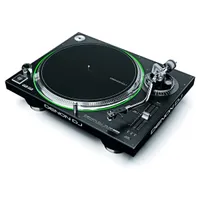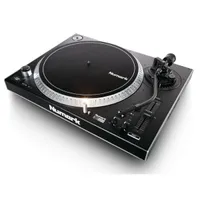Best DJ turntables: Top decks for vinyl DJs
Our guide to the best DJ vinyl turntables around, for bedroom DJs, seasoned pros, and everyone in-between
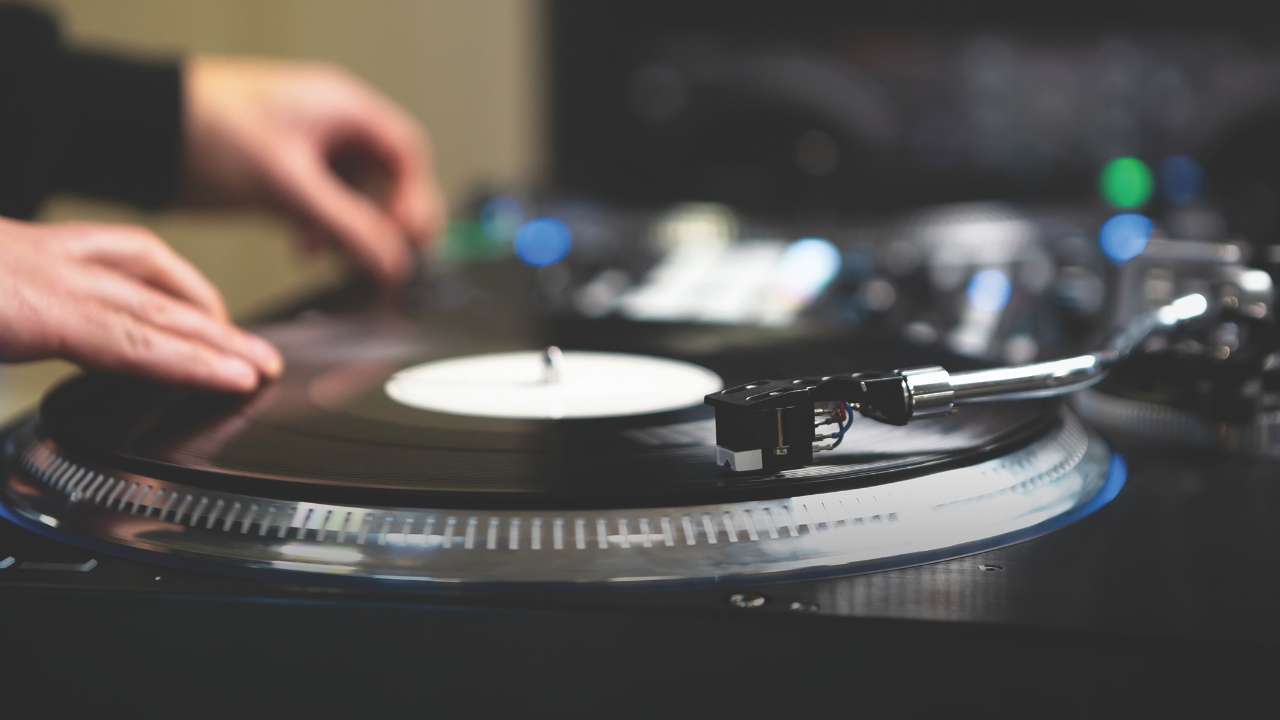
Want all the hottest music and gear news, reviews, deals, features and more, direct to your inbox? Sign up here.
You are now subscribed
Your newsletter sign-up was successful
There’s a reason why all the turntables on this list look pretty similar. It’s because they’re all based on what remains one of the best DJ turntables, the mighty Technics SL-1200 and its near-identical twin, the SL-1210. Quickly adopted by early hip-hop, disco, and house DJs on its launch, the 1200 became the DJ vinyl deck of choice. Its smooth pitch control and rock-solid quartz-locked direct-drive platters made it the perfect deck for beatmatching and mixing, while its famous build quality meant it was tough enough to withstand even the most extreme use from hip-hop scratchers and turntablists.
Since the late 1970s, its combination of reliability, sturdiness, and functionality has made the 1200 the industry standard vinyl deck for clubs, festivals, raves, bars, and radio, and it remains so today. And despite the comprehensive impact of MP3s, streaming, and the general digitisation of the music industry, vinyl records have never gone away. In addition to the huge quantities of superb 90s dance music still only available on vinyl, more and more vinyl labels have sprung up over the last few years too, and the market for DJ vinyl decks has also continued to grow.
So if you have different needs or a smaller budget, then there are plenty of great alternatives to Technics 1200s and 1210s to consider. We’ve rounded up the best of them in this guide, and to help you navigate your way through the wide range of vinyl decks that are now available, we’ve also put together some handy FAQs at the bottom of this article.
Our top picks
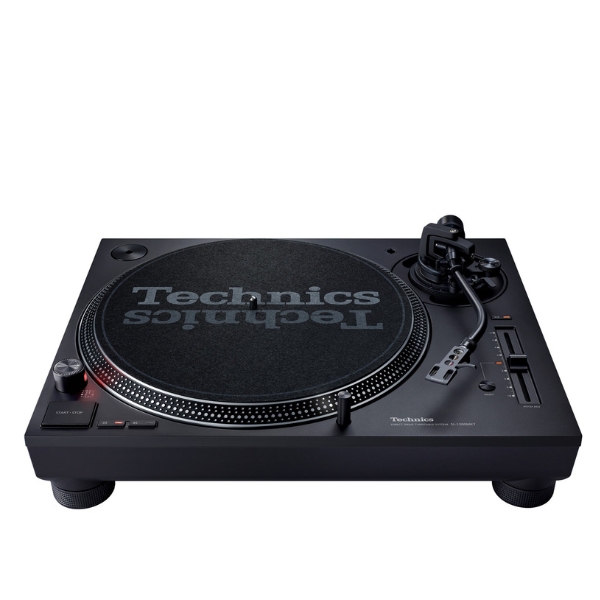
Now that the Technics SL-1200/1210 is back in production with the Mk7 version, it’s undoubtedly regained its crown as the definitive, go-to DJ turntable. Even in its updated form it’s still the standard model of choice for DJs, and not without reason.
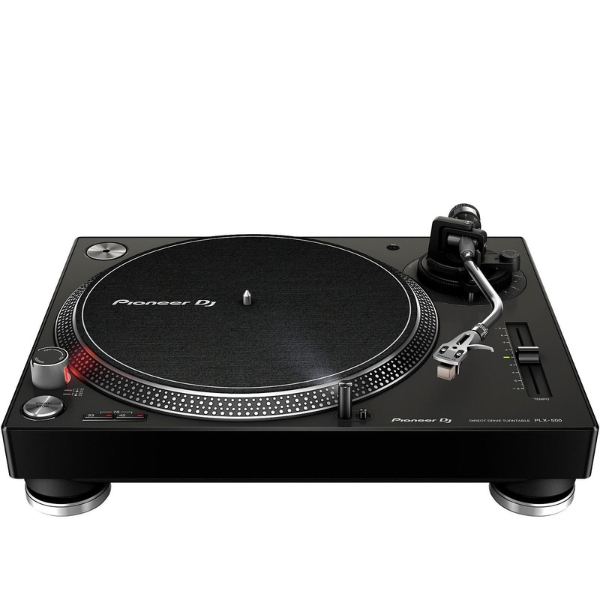
For the more budget-conscious, a pair of Pioneer’s PLX-500s cost less than a single SL-1200, and the look and feel punches well above that price point. It's got rock-solid build quality and great torque for the money.
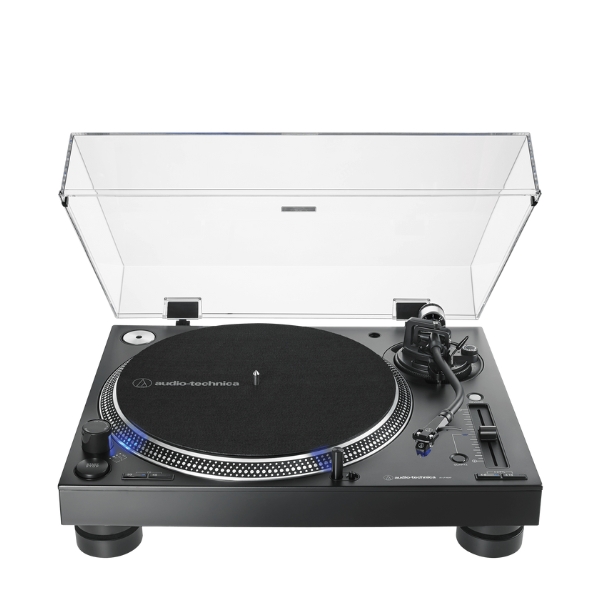
If you're looking for your first set of vinyl turntables or you're making the move from digital decks, we'd go for the Audio-Technica AT-LP140XP. It's great value for money and comes with an AT-XP3 DJ cartridge.
Best overall
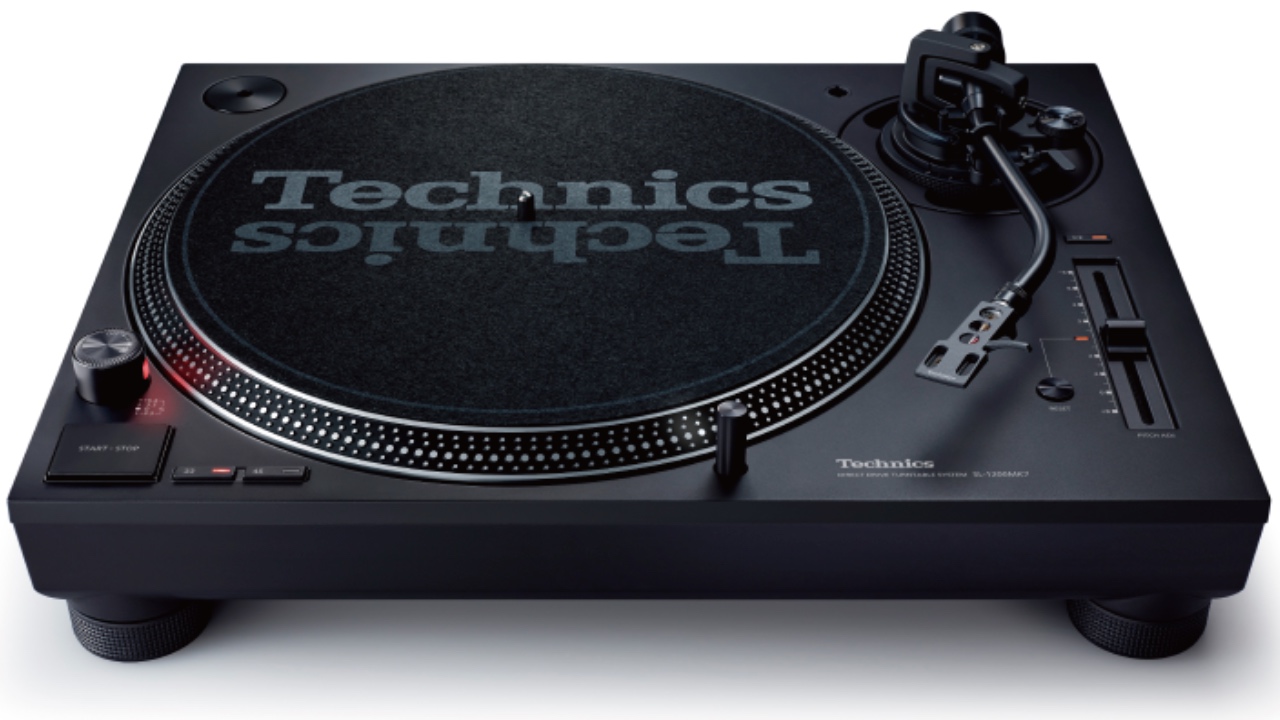
1. Technics SL-1200/SL-1210 Mk7
Our expert review:
Specifications
Reasons to buy
Reasons to avoid
✅ Buy if you want the gold standard DJ turntable: It's often imitated for a reason, and little has changed with the SL-1200 since it first came out in 1979, and it remains the best DJ turntable overall.
❌ Avoid if you want lots of features: The design of the SL-1200 is quite basic, so if you're looking for more features like digital functionality there are other options.
Throughout their production run from 1979 up to 2010, the original SL-1200s changed very little in terms of design and materials; a 2010 unit was remarkably similar to the original Mk2s coming off the production line in the late ’70s. When Panasonic brought production of a DJ-centric 1200 back in 2019, they had to create a new production process and effectively ‘redevelop’ a new version of the classic design.
There are a number of changes between the Mk7 and the original decks, but they’re mostly subtle and in many cases decidedly positive. While the dimensions, feel and style are all familiar, the new SL-1200s have a slightly modernised look, along with a new, more powerful motor.
Feature-wise, it’s mostly a case of ‘if it ain’t broke...’ but there are some small, welcome upgrades: the RCA and power leads are now detachable, so far-easier to replace, and the pitch fader now has a x2 mode for doubling its range. Functionally, there’s no difference between the 1200 and 1210 models here – the names are just regional.
These latest models are no-longer produced in Japan, and the build is, by all accounts, not quite up with the Mk2s, although it’s still solid. In terms of the all-important sound and feel though, these new 1200s live up to the legacy. These remain the industry standard and, if you’re buying a new DJ turntable, you can’t really go wrong here.
Best budget
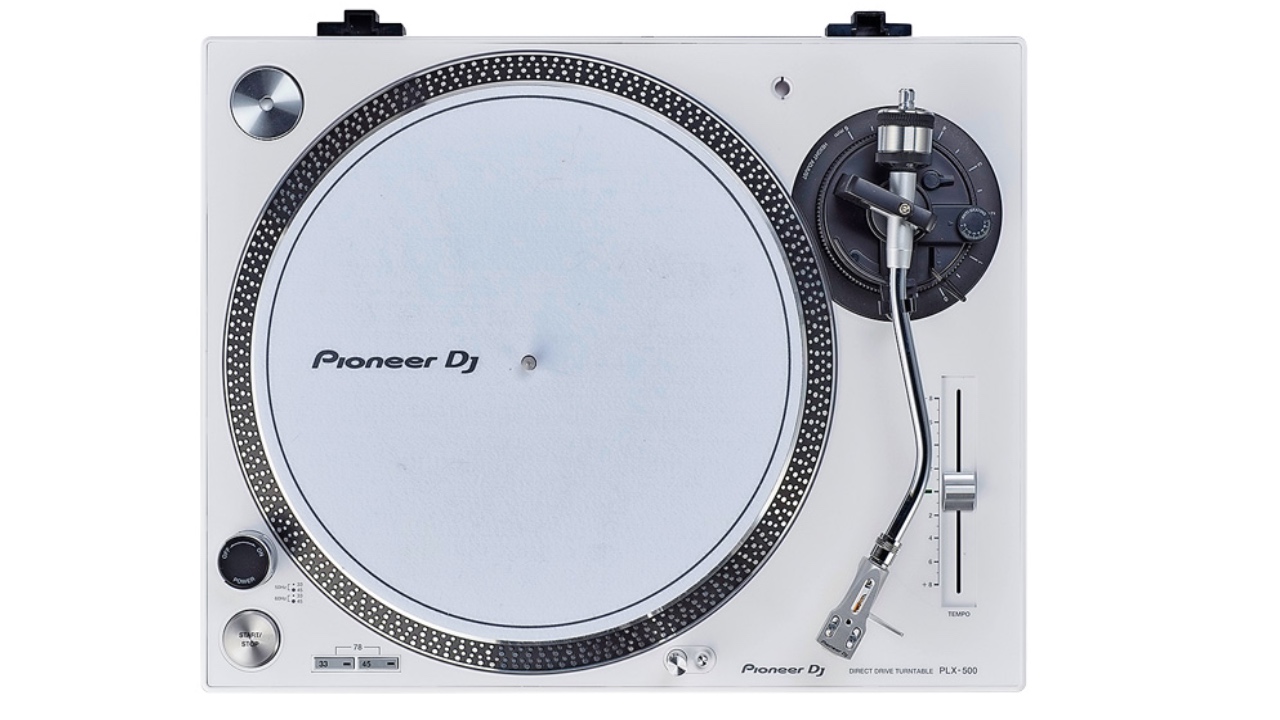
Specifications
Reasons to buy
Reasons to avoid
✅ Buy if you want a low-cost DJ turntable: Pioneer's entry-level offering is a fantastic choice if you're on a tighter budget but still want a good quality turntable.
❌ Avoid if you want something robust: Both the tonearm and the RCA cables do feel a little cheap compared to others here, so we're not sure how well they'll put up with performing regular sets.
Although Technics dominate the DJ turntable market, Pioneer DJ are the standard when it comes to CDJs, so it’s a brand name with a lot of clout when it comes to DJ gear.
The PLX-500 is Pioneer’s entry-level DJ turntable, which has a similar look and many of the same features as the 1200-rivalling PLX-1000 turntable, albeit at a street price that means you can pick up a pair for under £600. While the motor doesn’t have quite as much power as its higher-priced sibling, it should be enough to suit all but the most serious scratch DJs.
There are design elements where you can tell costs have been cut – the tone arm and RCA cables feel a little cheap compared to ‘pro’ level decks – but on the whole the build is solid and the torque and stability punch well above the price point. There are cheaper decks out there, and better spec’d ones, but for quality and style at this price point, the PLX-500 is hard to beat.
Read our full Pioneer DJ PLX-500 review
Best for beginners
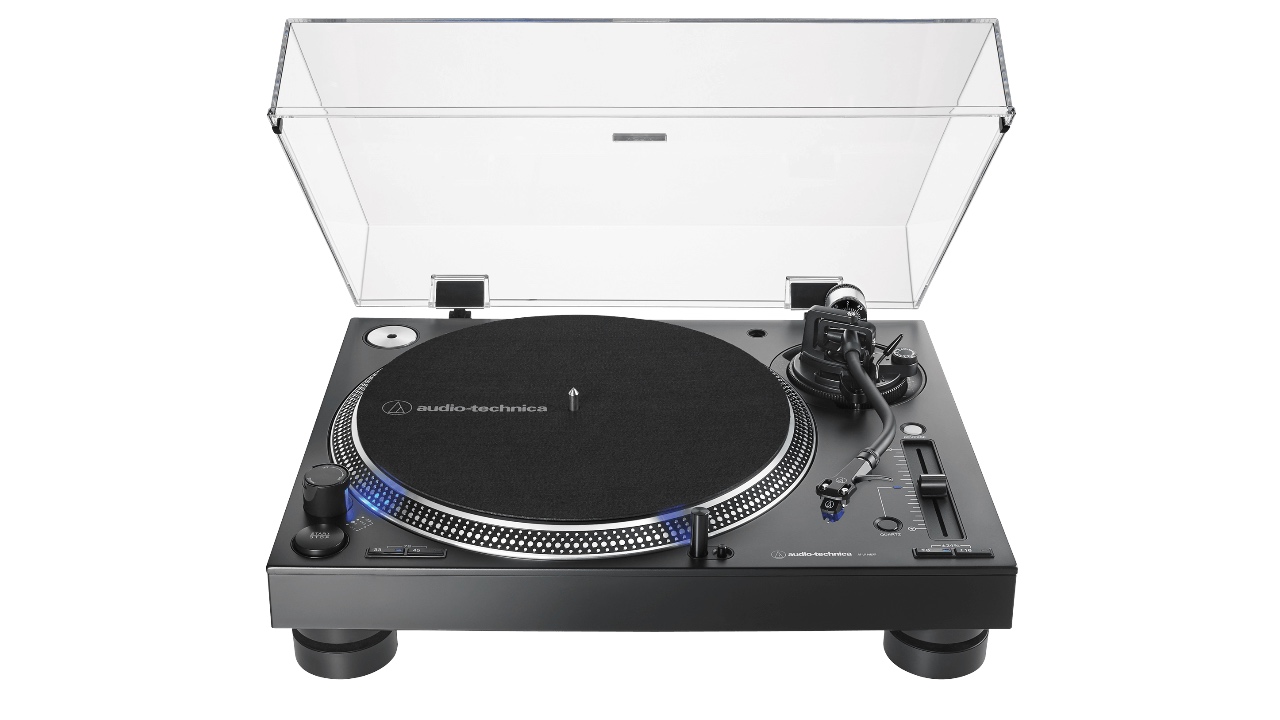
3. Audio-Technica AT-LP140XP
Our expert review:
Specifications
Reasons to buy
Reasons to avoid
✅ Buy if you want your first DJ turntable: It's fairly standard, but solid build quality and an adjustable pitch fader make this a great option if you're after your first set of DJ turntables.
❌ Avoid if you need more functionality: This is a pretty basic set of DJ turntables so if you want lots of features then you're better off looking elsewhere.
Audio-Technica is better know in the DJ and production world for its cartridges and their studio headphones, but its sole DJ-centric turntable is no slouch either. This is a classic, mid-priced Technics-inspired deck.
There are a few factors that differentiate it from its inspiration – removable RCA leads, adjustable pitch fader – but on the whole this is a solid, if fairly standard DJ turntable.
Possibly the most appealing standout factor here is the fact it comes pre-stocked with one of Audio Technica’s AT-XP3 DJ cartridges. If you see the AT-LP140XP at a good price, there’s no reason not to go for it.
Best hybrid
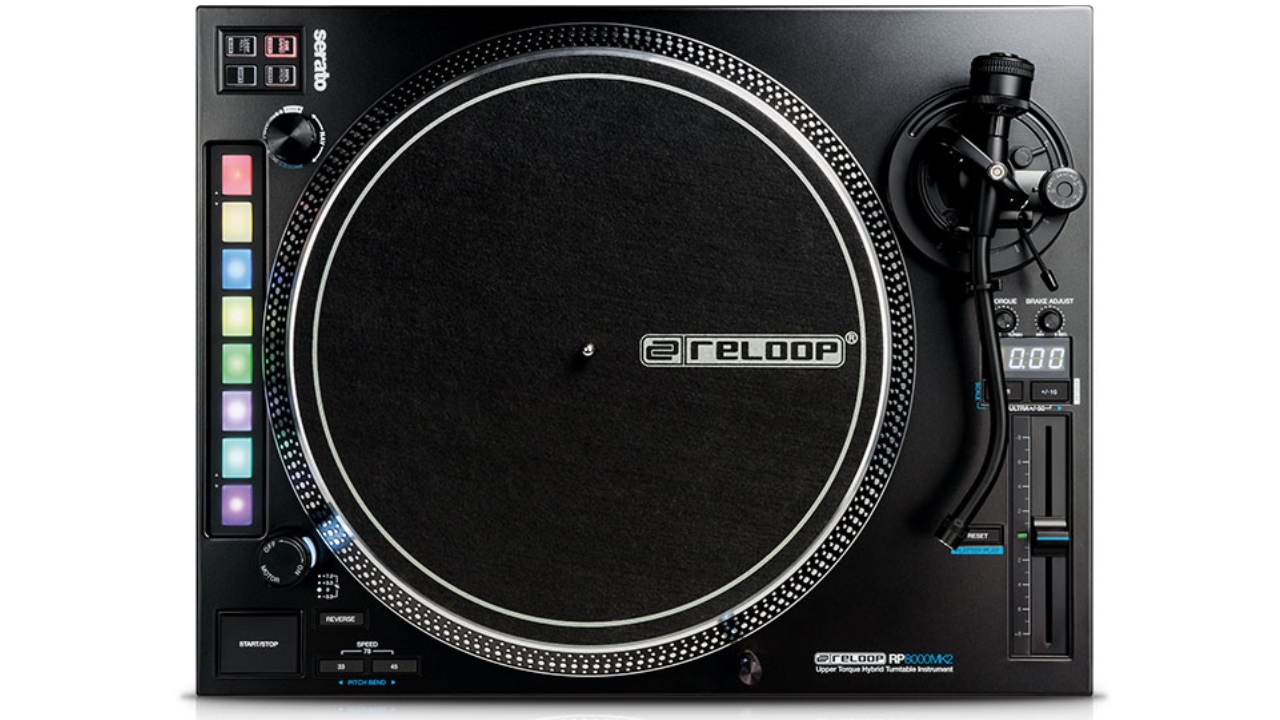
4. Reloop RP-8000 Mk2
Our expert review:
Specifications
Reasons to buy
Reasons to avoid
✅ Buy if you want vinyl turntables with digital functionality: As a hybrid turntable with adjustable torque, the RP-8000 makes a great DJ turntable for looping and slicing samples.
❌ Avoid if you like traditional decks: The digital functionality of these turntables will likely be a turn-off for purists.
Although it works perfectly well as a traditional record player, the RP-8000 is aimed primarily at DVS users – DJs who use a ‘digital vinyl’ system that allow them to control DJ software with a hardware turntable.
The RP-8000 is essentially a hybrid between a traditional vinyl turntable and a MIDI controller. Its direct-drive motor, adjustable torque and pitch faders, and Technics-like layout put it in line with many other 1200-inspired decks on the market, but by incorporating a host of rubber buttons it can also be used to perform a number of digital tricks such as hot cueing, looping, slicing and triggering samples.
As a companion to Serato DJ or Traktor, the RP-8000 has a lot going for it, and the price is appealing too. For DJs who want to incorporate modern touches into their traditional vinyl setup, this is a great option.
Best mid-level
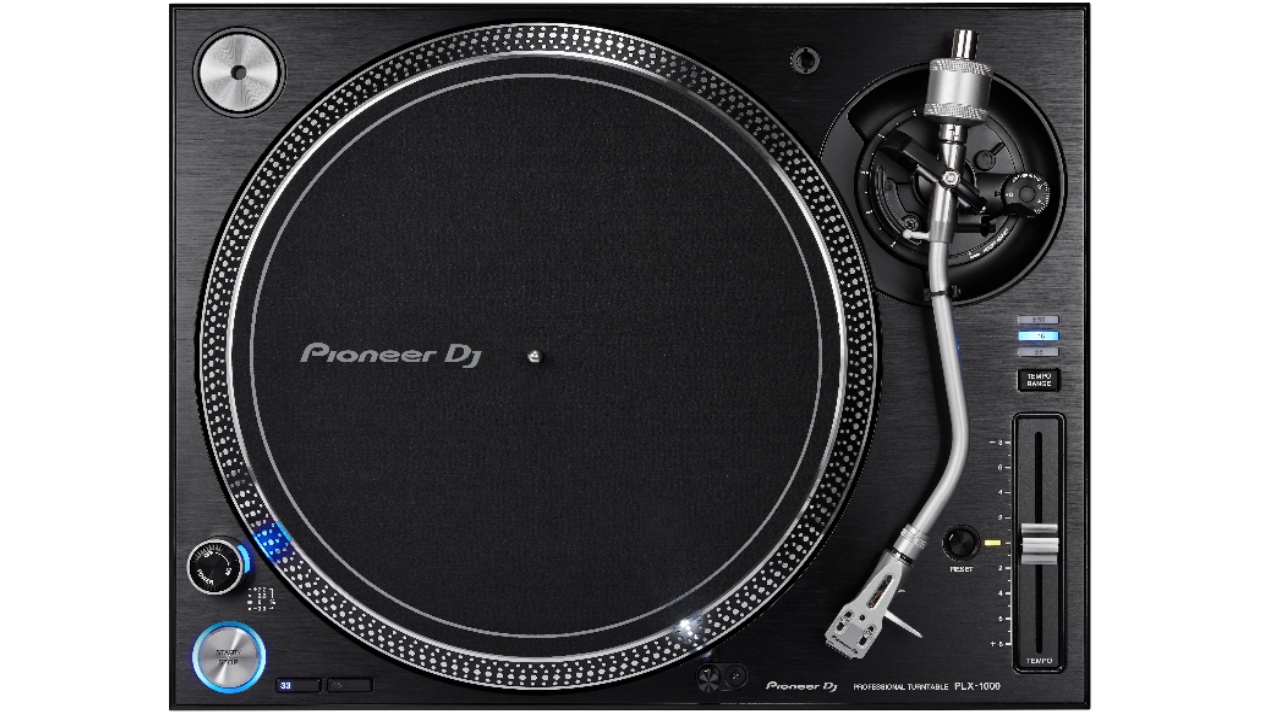
5. Pioneer DJ PLX-1000
Our expert review:
Specifications
Reasons to buy
Reasons to avoid
✅ Buy if you want an intermediate DJ turntable: Sitting in the middle of this list in terms of price and functionality, this is a great shout if you're looking for something above beginner level but not quite in the realm of the pros.
❌ Avoid if you want the best overall: These decks are based on the Technics 1200s, and with them being available new now you might find you're better off with the real deal.
In the days before Panasonic revived the Technics 1200s, Pioneer’s ‘pro’ DJ turntable looked all set to fill the gap in the market. One look at the PLX-1000s and its immediately obvious that Pioneer were aiming to closely replicate the look and design of the industry standards.
Debate raged amongst DJs about how close these came to the sound and feel, but it’s fair to say they’re in the right ballpark, with enough stability and power to make these impressive DJ decks in their own right.
Of course, now that you can pick up an actual Technics-branded 1200 new once again, the PLX-1000 is a slightly tougher sell. There are a few factors to differentiate the two though – these Pioneer decks retail for around $/£100 cheaper than their Technics counterparts, and there’s more flexibility in the pitch range too, with +/- 8%, 16% and 50% modes available.
Best for scratching
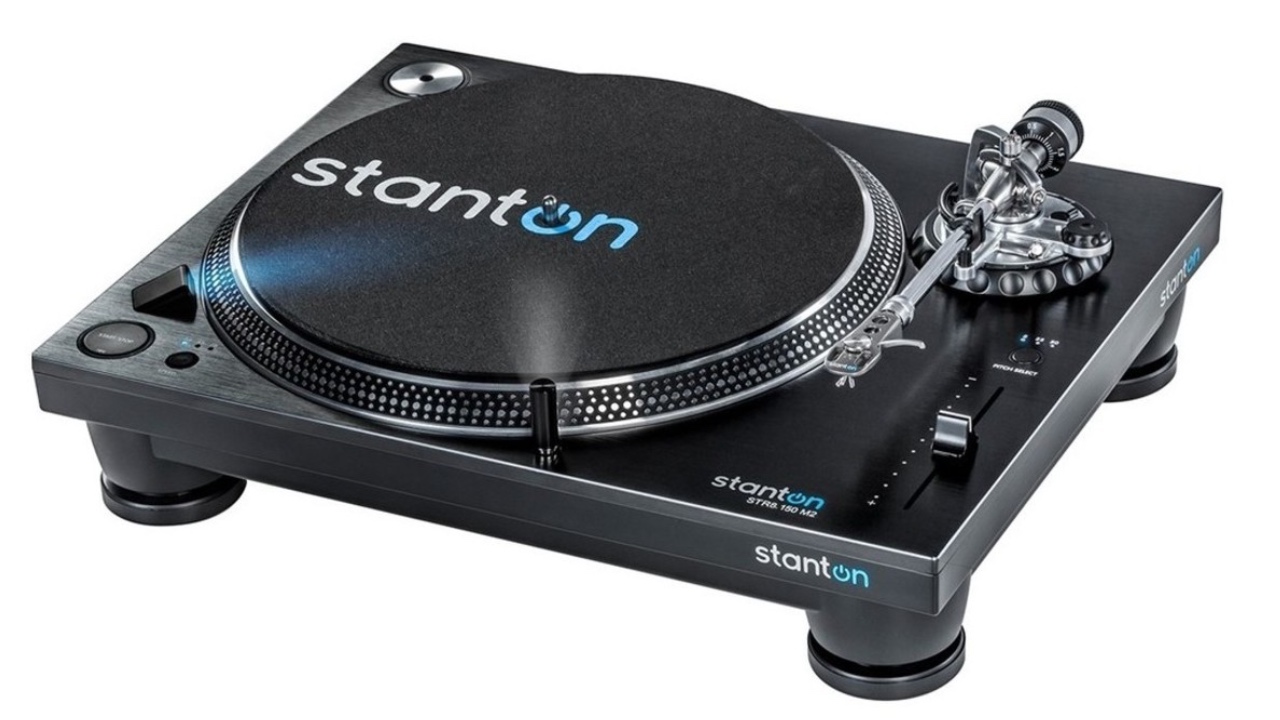
6. Stanton STR8 150 Mk 2
Our expert review:
Specifications
Reasons to buy
Reasons to avoid
✅ Buy if you want to scratch: The high torque of the Stanton STR8 makes it a great shout for scratch DJs, and features like a straight tonearm ensure a stable platform for precise vinyl manipulation.
❌ Avoid if you're on a budget: These flagship decks don't come cheap, so if you're on a tight budget you'll want to look elsewhere.
The flagship decks from US brand Stanton boast some of the highest torque on the market. The STR8 also features a ‘skip-proof’ straight tone arm, making it aimed squarely at scratch DJs.
They're lighter in weight than the MK1 version which could be a plus or a minus depending on your outlook. Some prefer the weightier feel of the original version, but others prefer a lighter unit that's easier to move around. The cartridge is great quality and holds its groove well, and that extra torque feels absolutely fantastic.
It boasts a heavy-duty aluminium chassis paired with low-resonance feet for reduced noise. Other features include an adjustable brake speed and switchable pitch fader. It also comes with a full license for Stanton’s DVS software, Deckadance.
Also consider
For us, the above DJ turntables are what vinyl DJs should be spending their money on. If you didn't find what you were looking for above however, here are some more great options for you to consider.
Denon DJ VL12
Direct drive | 12.4kg | 8%, 16%, 50% pitch range
The VL12 is part of Denon’s Prime range, which also includes powerful players and DJ mixers boasting a host of modern digital DJ trickery. Despite the bells and whistles of its Prime counterparts, this is a fairly straightforward vinyl turntable. The only ‘flashy’ feature to speak of is the light ring that sits around the edge of the platter providing a customisable visual effect.
★★★★½
Numark NTX1000
Direct drive | 9.5kg | 8%, 16%, 50% pitch range
Numark’s NTX1000 is a rugged Technics-inspired deck at a good price. It boasts powerful start-up torque and an adjustable range for the digital pitch fader, switchable between 8, 16, and 50%. There’s a USB output too, which is handy for those wanting to rip records from their collection to digital formats.
★★★★☆
FAQs
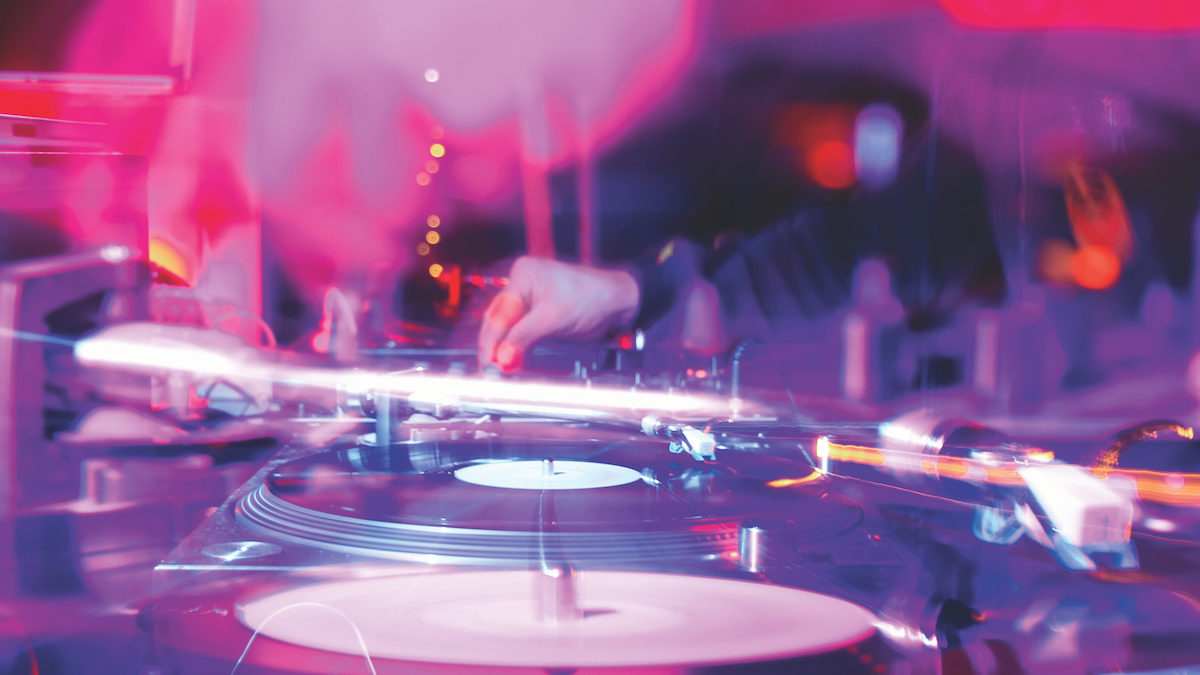
Why are Technics SL1200 considered the best?
,While they did – and still do – sound decent enough, the Technics SL1200 were by no means the pinnacle of audio quality, neither were they the most feature-packed record players on the market in their day. In fact, a combination of fairly straightforward features add up to make the 1200s an ideal tool for mixing music.
The first of these is the high-torque direct drive motor that, when combined with a slip mat, allowed DJs to scratch, nudge and generally manipulate records without the player itself grinding to a halt. Then there’s the now-ubiquitous pitch fader, that gave DJs precise control over the playing speed of a record, making it possible to sync one track with another. Other winning features included the sturdy, grip-like feel of the platter edge – ideal for slowing records – and the s-shaped tonearm.
Perhaps most important though was the rugged build quality, which was a cut above many other record players on the market. While the 1200s aren’t entirely free of flaws – common issues include gradual oxidisation of the tonearm connections and unreliable hardwired RCA leads – a well-maintained set would provide DJs with years of use.
To some extent, as time wore on, the 1200’s dominance became a self-fulfilling prophecy; new generations of DJs learnt to mix on 1200s because they were what their heroes used, and would become so used to the decks’ feel and design that anything different would likely throw them off their mix.
While the Technics 1200 series remains the definitive choice of DJ turntable, it’s not the only game in town. There have always been rivals out there that make a solid case for themselves by undercutting the Technics on price or offering additional features.
Technics’ parent brand Panasonic ceased production of the 1200 line back in 2010, citing fall in demand and difficulty sourcing parts, and although a new Mk7 deck has been in production since 2016, in the intervening years a number of potential third-party successors have emerged.
Are all DJ decks the same?
Do a little Googling around the subject of DJ turntables and you’ll rapidly stumble upon the term ‘Super OEM’, and likely a few forum posts telling you why many turntables need to be avoided. So what’s this all about? The long and short of it is the suggestion that the bulk of modern Technics-inspired turntables are rebadged versions of the same Super OEM range produced by a single Taiwanese company (Hanpin).
There is some truth to this; as with some other products, brands tend to outsource parts of production, and a number of turntables have underlying similarities between them because of this.
However, that’s not to say that there aren’t design variations between models. Equally, while there’s a case to be made that few turntables can match the sturdy build of the original Technics SL1200 Mk2, any forum posts telling you that all other models are a write-off are complete hyperbole. Our advice – don’t worry about it too much.
What drive type do I need?
There are two kinds of motor used in turntables – belt drive and direct drive. Audiophile turntables tend to opt for belt drive models as these distance the motor from the record itself, resulting in reduced vibration. It’s really difficult to carry out DJing techniques like cueing or nudging the platter on belt drive turntables as the motor lacks power.
Belt drive turntables have a literal little rubber belt connecting the underside of the platter to the motor and if you attempt any more advanced DJ technique like scratching or if you make too many nudges and pulls on the platter, the belt will likely come off, rendering the deck unusable until you remove the platter and reattach it. If you want to do any other DJ technique beyond simply playing vinyl, like cueing, beatmatching, beat juggling or scratching, etc., then a direct drive deck is vital.
Depending on the model and motor used, different DJ turntables provide varying degrees of torque - the power with which it drives the platter. The torque affects how rapidly the turntable starts up and how much pressure is needed to slow or speed up the record when mixing, and the higher the torque, the better the deck will be for DJing. However, any of the products in this round-up will provide enough power for most DJs. It’s only really high-level scratch DJs who need to worry too much about torque levels.
What about the tonearm?
The tonearm is the long arm with the cartridge and stylus (needle) at its end that you put on the record, and on DJ decks they tend to be either straight or ’S’ shaped. Functionally there’s little difference between the two, and although some scratch DJs swear by straight tonearms, the choice comes down to personal preference, and there’s no definitive right or wrong.
Do I need a cartridge?
Most but not all turntables come with a cartridge and stylus, so check before you buy, as it’s super-annoying to unbox your new deck but then not be able to use it straight away.
How does pitch control work?
While there are a few DJs who never adjust the pitch of their records, most do, and if you want to beat-match and mix tracks together, your direct drive turntables have to have pitch control. This is a fader that smoothly lowers or increases the speed of the motor, slowing down or increasing the speed the record plays at, enabling the DJ to accurately match the BPM (beats per minute) of each record and perform smooth transitions between them.
Pitch faders offer a percentage range by which they can speed up or slow down the record – a higher percentage range means more scope to reach higher or lower BPMs, but sometimes with less accuracy within that range. Modern pitch faders tend to be digital and more reliable. Newer varieties often allow users to change between a variety of different percentage ranges.
So unless you plan to never beat-match like David Mancuso at The Loft, you need your turntable to come with pitch control.
How we test
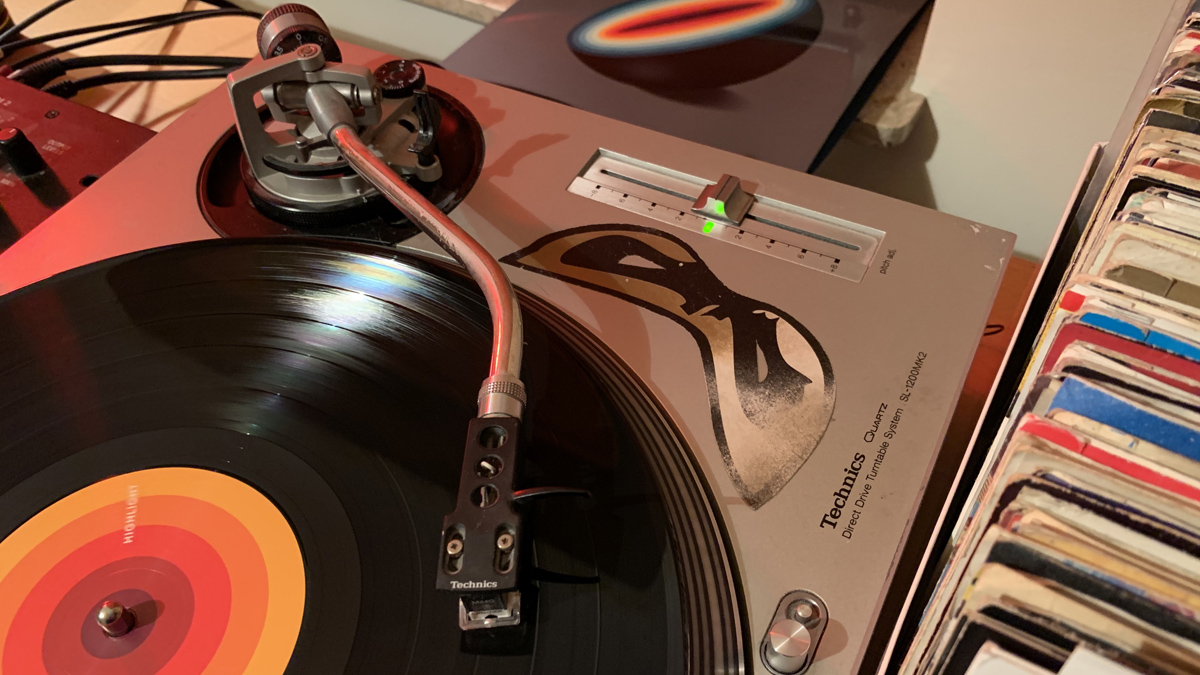
We test gear in the sensible way, by actually using it. For a DJ turntable that means getting hands-on mixing with it. Whenever our review team gets their hands on a new turntable you can bet that's their first port of call with it.
We do always consider that not every DJ uses vinyl in the same way, so as well as performing in our usual style we'll also try and put ourselves in the position of others. This means trying out different styles of vinyl manipulation, and different genres of music. We try long and slow mixes, check out all of the buttons and faders the turntable has, and ensure we test every feature in-depth.
We're also looking at how it interacts with our speakers and headphones, as well as our chosen DJ mixer. If we have multiple mixers we'll try the DJ turntable with those too, all in the aid of giving us an overview of how it will perform for the end user.
Find out more about how we test music gear and services at MusicRadar.
Related buyer's guides
MusicRadar's got your back
- The best DJ controllers from Serato, Traktor, rekordbox and more
- The best beginner DJ controllers: hardware for budding mix masters
- Our pick of the best DJ headphones available today
- Upgrade your rig with the best DJ speakers
- Check out the best beginner DJ mixers
- Best DJ laptops: PC and Mac options for the booth and beyond
- Essential DJ accessories for the studio to the booth
- Our pick of the best gifts for DJs
Want all the hottest music and gear news, reviews, deals, features and more, direct to your inbox? Sign up here.
I'm the Managing Editor of Music Technology at MusicRadar and former Editor-in-Chief of Future Music, Computer Music and Electronic Musician. I've been messing around with music tech in various forms for over two decades. I've also spent the last 10 years forgetting how to play guitar. Find me in the chillout room at raves complaining that it's past my bedtime.
